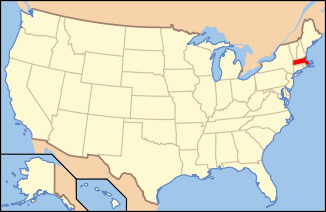Charles Playhouse
 | |
| Address |
Boston, Massachusetts United States |
|---|---|
| Owner | Key Brand Entertainment |
| Production | Blue Man Group and Shear Madness |
| Opened | 1957 |
| Website | |
|
Charles Playhouse | |
| Coordinates | 42°21′0″N 71°3′58″W / 42.35000°N 71.06611°WCoordinates: 42°21′0″N 71°3′58″W / 42.35000°N 71.06611°W |
| Area | less than one acre |
| Built | 1839 |
| Architect | Asher Benjamin |
| Governing body | Private |
| NRHP Reference # | 80000676[1] |
| Added to NRHP | June 16, 1980 |
The Charles Playhouse, of Boston, Massachusetts, is a theater at 74 Warrenton Street in the Boston Theater District. Blue Man Group and Shear Madness currently perform there.[2][3]
History
In 1957, the Charles Playhouse opened at 54 Charles Street. In 1958, the company moved to the current Warrenton Street location.[4] The Warrenton Street building was originally built in 1839, as the Fifth Universalist Church from a design by architect Asher Benjamin.[5][6] In 1864, it became the second home of Congregation Ohabei Shalom, the first synagogue in Boston.[7] It was later transformed into a speakeasy called The Lido Venice, which became the Southland ballroom and cafe- featuring prominent jazz artists such as Count Basie, Duke Ellington, Cab Calloway, Jimmie Lunceford, and many others during the Jazz Age.[8] [9]
In 1958, the Charles Playhouse staged a revival of O'Neill's The Iceman Cometh. The founding artistic director, Michael Murray,[10] led the company until 1968. The founder and managing director was Frank Sugrue.[11][12] The acting company included many stars-to-be such as Al Pacino, Olympia Dukakis, Jill Clayburgh, Jane Alexander, Ned Beatty, and John Cazale.[7] The company produced Boston premieres of plays by Brecht, Beckett, Osborne, and Ionesco, as well as classics by Shakespeare, Shaw, Ibsen, Pirandello, and others.
The Charles Playhouse was regarded as one of the pioneering regional theaters in America. In his book, Regional Theatre: the Revolutionary Stage, Joseph Wesley Zeigler identifies it as one of six theatres which were the foundations of the Regional Theatre Movement.[13]
Zeigler distinguishes the Regional Theatre Movement from the "little theatres" of the 1920s: community theatre organizations, and professional theatres that were established in towns and cities across America during the last half of the twentieth-century. The Regional Theatre Movement, in the late 1940s and 1950s, was the work of a small number of directors, actors, and producers to develop a new expression of professional theatre as an alternative to Broadway. "The early regional theatres ... started as reactions to the theatrical Establishment of their time – Broadway ... They were the new, anti-Establishment revolution."[14]
In 1995, Sugre sold the Charles Playhouse to Jon B. Platt, who operated the Colonial Theatre.[15] In 1998, Platt sold his Boston theatres to SFX Entertainment (now Live Nation).[16] In 2008, Live Nation sold most of its theatrical division, including the Charles Playhouse, to Key Brand Entertainment.[17]
See also
References
- ↑ "National Register Information System". National Register of Historic Places. National Park Service. 2010-07-09.
- ↑ ShearMadness.com. Whodunit Housed in Historic Buildings. Retrieved 2012-03-06
- ↑ Blue Man Group website. Retrieved 2012-03-06
- ↑ Elliot Norton (1978), Broadway Down East: an informal account of the plays, players, and playhouses of Boston from Puritan times to the present : lectures delivered for the National Endowment for the Humanities, Boston Public Library Learning Library Program, Boston: Trustees of the Public Library of the City of Boston, ISBN 0-89073-055-5, OCLC 3843437, 0890730555
- ↑ Mary van Meter. "A New Asher Benjamin Church in Boston." Journal of the Society of Architectural Historians, Vol. 38, No. 3 (Oct., 1979), pp. 262- 266
- ↑ "Boston Pulpit". Gleasons Pictorial (Boston, Mass.) 5. 1853.
- ↑ 7.0 7.1 Blowen, Michael. "Curtain to rise on a new Charles." Boston Globe, 22 Sep 1995: 58.
- ↑ Sheridan, Chris (August 1986). Count Basie: a bio-discography. Greenwood Press. p. 1017.
- ↑ Basie, Count (2002). Good Morning Blues: The Autobiography of Count Basie. Da Capo Press. p. 226. ISBN 978-0-306-81107-4.
- ↑ McLaughlin, Jeff. "Charles Playhouse celebrates 30th anniversary." Boston Globe, 23 Sep 1988: 63
- ↑ McLaughlin, Jeff. "Playhouse renovated." Boston Globe, 17 May 1985: 51.
- ↑ Jeanne Muller Ryan, 71
- ↑ Zeigler, Joseph Wesley, Regional Theatre: the Revolutionary Stage, New York: Da Capo Press, 1977, pp. 24-61, Note: founding theatres cited by Zeigler are Alley Theatre, Houston (1947), Mummers Theatre, Oklahoma City (1949), Arena Stage, Washington DC (1950), Actor's Workshop, San Francisco (1952), Milwaukee Repertory Company (1954), Front Theatre, Memphis (1954), and Charles Playhouse (1957)
- ↑ Zeigler, p.170
- ↑
- ↑ Bound for Boston: SFX subsidiary gains legit house American Artists
- ↑ Live Nation Finds a Buyer for Its Theater Business
External links
| Wikimedia Commons has media related to Charles Playhouse. |
- Official website
- Boston Public Library, Special Collections. William B. Jackson Theater Collection. Includes materials related to the Charles Playhouse
- Boston Public Library, Rare Books and Manuscripts Department. Charles Playhouse Collection, 1945-2003
| ||||||||||||||||||||||||||||
| |||||||||||||||||||||||||||||||||||||||||||||||||||||||
